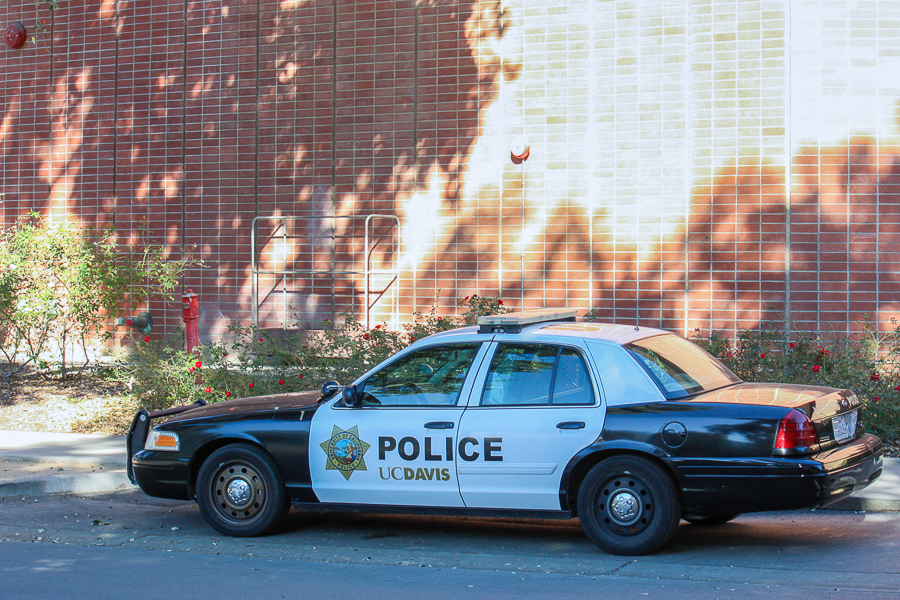
On campus resources available to students who are victims of sexual violence
Twice during Fall Quarter, students have been notified via e-mail or text message of sexual assaults occurring near campus. One incident was at West Village and another on A Street near the intramural fields.
The first occurred late at night on Oct. 2 when a male subject in the guise of an Uber driver demanded a kiss as payment.
“On [Oct. 2] between 1 a.m. to 1:10 a.m., an unknown male subject claiming to be an Uber driver picked up three females at the above address,” said an alert sent by the UC Davis Police to the campus community. “He dropped two females at their residences on campus. The third female was driven to her residence at West Village. The male Uber driver insisted on a kiss as payment for the ride but unlocked the door when a Police Department Safe Rides vehicle drove past him. The female exited the car and fled to her apartment.”
On Nov. 5, sexual battery occurred on campus near the A Street intramural fields.
“The sexual assault that took place on Nov. 5, 2016, [is] classed as a 243.4(a) PC Sexual Battery,” said Jennifer Garcia, interim UC Davis police chief, via e-mail. “A female student was walking on A Street near the UC Davis [intramural] fields. [An] unknown suspect riding a bicycle committed a battery on the victim and rode away on his bicycle. There is no other public information at this time.”
There are several on campus resources available to individuals who have experienced sexual assault. One of these resources is the Center for Advocacy, Resources and Education (CARE). CARE is a confidential resource for victims of various sexual crimes.
“Any situation of sexual harassment, sexual assault, dating violence, domestic violence or stalking is considered confidential through us, meaning we are not a responsible employee,” said Sarah Meredith, director of CARE. “We do not have to notify Title IX. In addition to that, we would not tell police or family members or friends, media, newspapers or that kind of thing unless we had a signed release from the client that we are working with.”
CARE serves as a resource to help victims discern the correct course of action for their individual circumstances.
“Our job or our position is not to persuade or dissuade from any course of action; we really just want to make sure that they know what all of their rights and options are so that they can make the best choice for themselves,” Meredith said. “Whatever choice they make at that time, we just want to make that as easy as humanly possible.”
In addition to serving as a resource for victims of crimes, CARE also serves as a campus educator to help prevent sexual violence.
“We are the primary facilitators for all of the mandatory education for incoming undergraduate students,” Meredith said. “We also collaborate with the Harassment and Discrimination Assistance and Prevention Program to facilitate the mandatory education for graduate and professional school students. In addition to the in-person orientation session, we hold numerous ongoing education opportunities.”
While CARE offers reporting to the police as an option for victims, the police also work with CARE when a sexual violence crime is reported to them.
“When someone reports to the police, all they need to do is call us,” Garcia said. “We will send an officer to their location to meet with them. We also contact a CARE advocate if they wish to help them through the difficult process. We make every effort to ensure victims are not re-traumatized through the process. It’s a difficult process for victims to relate what happened to them and oftentimes the system is frustrating at best. The goal for the police to is gather the facts and compile a comprehensive report that the judicial system will use for successful prosecution.”
According to ASUCD Senator Josh Dalavai, the reporting process is difficult because there is a stigma surrounding sexual violence.
“The primary barrier survivors face is an institutional and interpersonal lack of belief in their claims,” Dalavai said. “Police departments, peers and counselors are typically socialized to attempt to deflect blame from the perpetrators of sexual assault and instead place blame on survivors. A large part of breaking rape culture down starts at the most basic step of telling someone you believe them and being all ears.”
Some, like Meredith, work hard to break the barrier Dalavai described.
“I really wish that offenders would just stop doing what they are doing,” Meredith said. “I tell people all the time that I would be happy to work myself out of a job. I love what I do, but I would be more than happy to find another profession if we could just get [sexual violence] to stop.”
Written by: Kenton Goldsby — campus@theaggie.org



